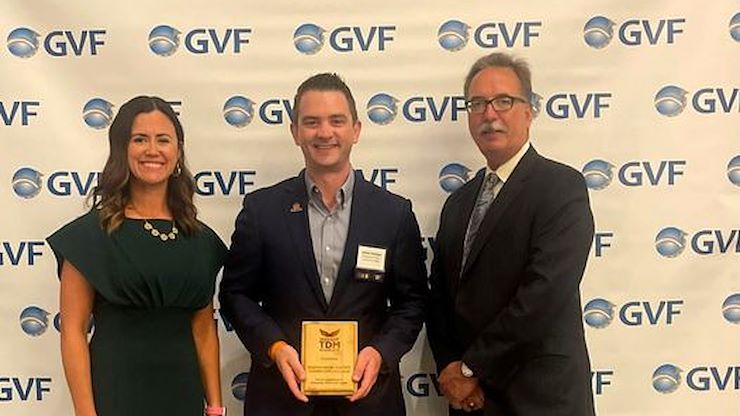
Greater Valley Forge Transportation Management Association recognizes organizations, including Montgomery County Community College, that are committed to traffic strategies and programs that will improve the climate and increase the efficiency of roadways. Photo courtesy of GVF
Montgomery County Community College was one of 28 Transportation Demand Management (TDM) Advocates recognized by Greater Valley Forge Transportation Management Association (GVF) during its annual TDM Advocates Breakfast on Sept. 19.
GVF is a not-for-profit organization that inspires mobility choices for all. For more than 30 years, GVF has focused on climate, equity and overall quality of life by reducing single-occupancy vehicles and promoting alternatives like biking, transit, walking, working from home, carpooling and vanpooling, according to its website.
Transportation Demand Management (TDM) refers to strategies, programs, or policies designed to reduce drive-alone trips and enable the transportation system to function more effectively and efficiently through alternative transportation options such as biking, walking, carpooling, vanpooling, public transit, or telework. Implementing TDM strategies helps to improve the climate and increase the efficiency of regional roadways.
Through GVF’s TDM Advocates program, organizations are encouraged and recognized for
their commitment to programs that promote commuting alternatives and improve the
environment and quality of life for employees and the community. This year's organizations
include Fortune 500 companies, colleges and universities, engineering and development
firms, retail locations, and local municipalities.
The 2022 TDM Advocates include American Heritage Federal Credit Union, Borough of
Pottstown, Brandywine Realty Trust, Chester County, Econsult Solutions, HDR, HNTB,
King of Prussia Mall, Limerick Township, Lower Merion Township, McMahon Associates,
Michael Baker International, Montgomery County, MCCC, Municipality of Norristown,
North Coventry Township, Pennoni, Qlik, RK&K, SEPTA, Stantec, Suburban Transit Network,
Traffic Planning & Design, Tredyffrin Township, Upper Merion Township, Urban Engineers,
Vanguard and Whitpain Township.
MCCC has had a longstanding commitment to sustainability and incorporates sustainable practices in its transportation options, facilities management and campus operations. MCCC has been offering online courses for more than 20 years, allowing students to learn remotely and save time and costs commuting. During COVID-19, MCCC quickly pivoted to provide online learning for all students and continues to offer flexible online learning options.
In addition, MCCC has public transportation stops on both the Pottstown and Blue Bell Campuses. SEPTA operates two bus routes directly to the Blue Bell Campus, and the Pottstown Campus is served by SEPTA and the Pottstown Area Rapid Transit. MCCC also offers an environmentally friendly, free shuttle service (with Wi-Fi service and wheelchair accessibility) for students and employees to travel between Pottstown and Blue Bell and vice-versa. Students and employees also carpool.
Both campuses are located near bike trails and/or roads with bike lanes for biking and walking to campus. MCCC is planning to expand the trails and green space at its Pottstown Campus.
